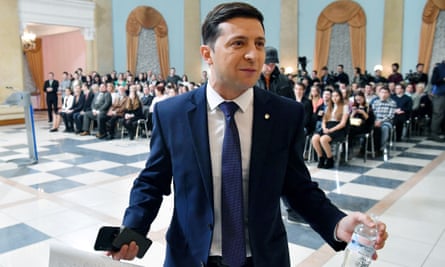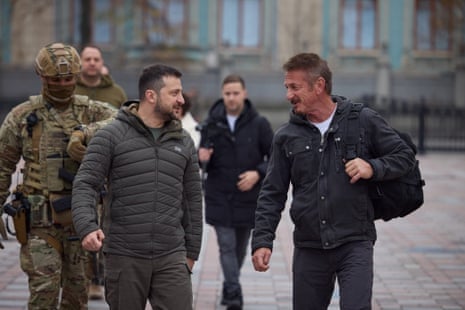It is just before 10am and Sean Penn does not want to be here. He made the mistake, he confesses, of sleeping last night with the curtains closed. He slips into acting mode and does a funny impression of a groggy man being jolted awake. Now he craves daylight.
So we abandon Off the Record, a basement bar at Washington’s venerable Hay-Adams hotel, and head up to a room on the third floor. Penn’s publicist hastily wheels room service breakfast out of the way and apologises for her unmade bed. The 63-year-old actor settles into an armchair by an open window, sunlight exploring light and shade on his chiselled features. He drinks a bottle of Sprite and says contentedly, “Whatever time you need,” – words guaranteed to make his scheduler nervous.
Penn is in the nation’s capital to promote Superpower, a documentary he co-directed about Ukrainian president Volodymyr Zelenskiy and the resilience of the Ukrainian people following the Russian invasion. After a screening of the film, Nancy Pelosi, former speaker of the House of Representatives, held him in a long embrace as she told him: “Beautiful, beautiful, beautiful.”
Not everyone is so gracious about Hollywood actors dabbling in geopolitical affairs. Celebrity status opens doors and closes minds. Anyone who was around in the 1980s may remember Penn as the guy who played stoner and surfer Jeff Spicoli in Fast Times at Ridgemont High, spent 33 days in jail for assaulting an extra, and married and divorced Madonna.
Four decades later, his hair is white but he is still a big name method actor with Oscars for Mystic River (2003) and Milk (2008). A profile in Variety magazine opined that in Superpower “there’s a bit too much Sean Penn doing Sean Penn things in a war zone”. Penn anticipates this kind of thing in the film when he parodies an imaginary critic by asking: “Who do you think you are – Walter Cronkite? Do you have a saviour complex?” His answer: “I’m curious … and sometimes I feel I can be helpful.”
He has receipts to prove it. Frustrated by the search and rescue efforts in New Orleans after Hurricane Katrina in 2005, Penn bought a boat, reached survivors, gave them money and took some of them to hospital. In 2010, after an earthquake left thousands homeless in Haiti, he built a camp, launched a charitable organisation and lived in the country for months at a time.
Today, wearing dark jacket, blue shirt, blue jeans and white trainers, and situated just a three-minute walk from the White House, Penn addresses scepticism of his humanitarian work by reaching for an aphorism: “I dream of a world where chickens can cross the road without having their motives questioned.”
He elaborates: “People are willing to admire actors up to a point. But then it’s going to be the cliche: all of them are rich. The celebrity versus the actor or the artist, or whatever it is. I don’t have any more time to defend myself against that.
“I’ve been in a lot of interesting places, and I’ve been able to experience them in a unique way because of access. And also because – even when I have specifically been doing what would fall under journalism – I don’t feel any obligation to a style of journalism that requires more than my talent allows. My talent is that I’m interested.
“As much flak as I’ve gotten, I’ve archived almost none of it visually. Because I know if there’s a camera with me, well, that’s what I’m doing, right? That’s the assumption: ‘Oh, he’s trying to get pictures taken of himself.’”
Penn did not originally intend to be on camera in Superpower, but then he hit a wall trying to get the film financed. So viewers see him conversing with Zelenskiy, walking the deserted streets of Kyiv on the night of the invasion, and unburdening his security detail (“Can I be very blunt? You’re Sean Penn, nobody’s going to be responsible for your dying on the front lines”) by leaving them behind as he follows Ukrainian soldiers to trenches evocative of the Somme.

Penn, who made seven trips to Ukraine, points out: “Docs are pretty hard to get money for now. [It would’ve been hard to fund] unless I was on camera. So you know what? This time I’m just going to let anybody who wants to, to jump in my backpack and see what I see.”
The twist in the actor-activist’s story is that the chief subject of his film is an actor-politician. Superpower neatly curates archival clips of Zelenskiy’s past as a comedy star who played a piano with his penis and who, in the series Servant of the People, played a fictional Ukrainian president. With echoes of Ronald Reagan and Donald Trump, he demonstrated the potency of on-screen charisma when running for election against the political status quo.
It was this aspect that first intrigued Penn, after planned film projects on Syrian president Bashar al-Assad and murdered Saudi journalist Jamal Khashoggi failed to get off the ground. “On the surface, maybe the world was moving into a big new phase of populism,” he says of Zelenskiy. “But that’s not what I encountered with him.
“There was something interactive that had happened in that country since 2014, where the Ukraine that one would perceive from the outside was being reinvented by young people and their young president.”
Has Zelenskiy’s talent as a performer been important to rallying western opinion and winning the communications war with the Kremlin? “I’d say that the performer was helped by a generous heart that wanted to share – which led him to become a performer. The actor stuff is the easy go to. They did it with Reagan.”
Penn lowers his voice and does a fine impression of film director John Huston: “It’s one thing to have an actor in the White House. Quite another a bad actor.”
He continues in his own voice: “The Ukrainians have a really good actor in their palace and before he was a good actor he was a good communicator. And he was a good communicator because he saw in people what really existed and what mattered, and saw it through the lens of humour and courage as a man. He has met this challenge as the Ukrainians have met this challenge, in a way that is inspiring to the world. We should not let it go. It’s important medicine for all of us right now.”
Due to delays caused by the pandemic, Penn did not meet Zelenskiy in person until 23 February last year. Filming for Superpower began the following day – the same day Russia launched its invasion. Some Ukrainians interviewed by Penn doubted that Zelenskiy possessed the steeliness necessary to defy Vladimir Putin.

But meeting Zelenskiy in the bunker of the presidential palace, Penn found Prince Hal transmogrified into Henry V. “It’s as if he was born for this moment. It was very moving. There are certainly great, brave leaders on all the continents today – but not with an enemy next door with nuclear weapons. This is a new paradigm.”
Penn’s admiration for Zelenskiy – whom he gave one of his Oscars to keep for the duration of the war – is matched only by his disregard for Putin. “I would not react differently to Putin’s death by natural means than I would, let’s say, if he were stripped naked and burned bit by bit to death by cigarettes and had people defecate on him until he had nothing else to eat. It would be the same. I don’t count him among us.”
Wary of provoking Putin into a conflict that could spiral into a third world war, the west’s initial response was incremental. But slowly it has turned up the dial. By July of this year, the US had given more than $75bn in humanitarian, financial and military aid to Ukraine, and indicated that it would allow European allies to provide American-made F-16 fighter aircraft. Penn, who has lobbied for the jets, believes that more decisive, more complete action is necessary.
“I use the word cowardice because I do not know any other word to describe what happens when we argue caution as restraint. Restraint looks like John F Kennedy holding back military action during the Cuban missile crisis – that is a powerful piece of leadership. Caution looks like, ‘I’m scared the bad guys are going to do something if I do what’s right, so let’s do nothing. Or let’s do just enough that won’t get me more scared.’”
He adds: “The good news is that the Ukrainians, both in leadership and on the ground, have not entirely lost faith in us. And while certainly one could get lost in the fact that there have been so many unnecessary deaths – and I believe this war would have been over had decisive action been taken – I don’t think it’s too late to take decisive action. I’m talking about doing everything it takes to arm them with everything they need to let Russia know that they can play tough, too.”
Trump – the front-runner for the Republican party’s presidential nomination – and a prominent faction of his party are increasingly questioning support for Ukraine, making it into just one more contentious battleground in America’s polarised politics. What Superpower throws into sharp relief, meanwhile, is the sense of unity and national identity that Ukrainians have forged under threat from an external foe.

It made Penn see his own country anew. “It was like breathing a different kind of air. I knew we had problems and divisions, and that the fragile aspiration of America was in great peril. BB King said he had to play an A chord once for half an hour before he heard it. This was the first time I realised how much we need that unity, that feeling.”
He laments: “We don’t love each other in this country. We don’t like each other in this country. We’re nasty to each other. We fear each other, and we’re trading courage for cowardice and not realising that, in doing so, we’re also trading away something that all of us need, which is that we’re social animals and we want community.
“The data is in around the world: where longevity exists, community exists. We experience it ourselves. We know that the times in our life that we are happy are because, whether in the micro or macro, there’s a moment of community.
“For all the horror of 9/11, something felt good, didn’t it? Because we didn’t question each other. We knew what we had in common and that bonded us.
Penn flies a big US and a big Ukrainian flag at his home in Malibu, California. “I’m a big proponent of the idea that we start waving our flags again, even if we’re on the left, and we not worry that our neighbours are going to think we suddenly became a Maga hawk – which is what some of my friends accuse me of.”
Ukrainian flags are less visible around the US these days. Attention spans are short and polls show waning support for the war effort. Zelenskiy is heading to Washington this week to test his star power against the fragility of the moment. Before last Thursday’s screening, Penn admitted to the audience: “As a film-maker, I would say that one always worries that somehow the projector is going to break. I hope that doesn’t happen.”
